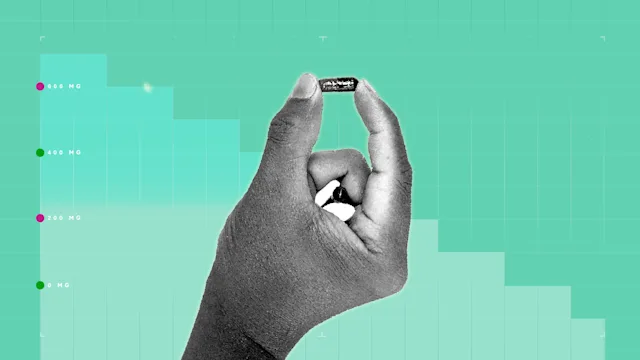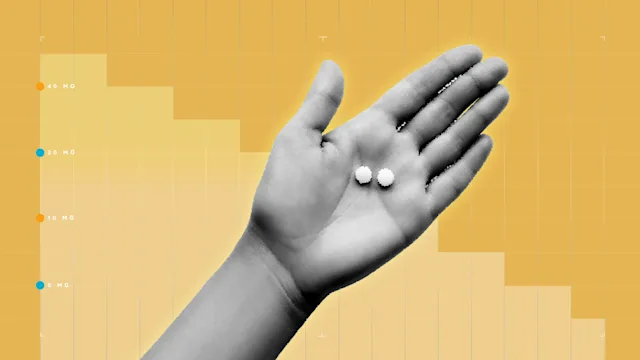Key takeaways:
A diet rich in fresh fruits, vegetables, and whole grains may help you get the most from your ADHD treatment.
ADHD medication can suppress appetite, and this can lead to weight loss and poor growth in children with ADHD. So it’s important to prioritize foods that are high in vitamins and minerals.
There’s not enough evidence to show that supplements improve ADHD symptoms. It’s best to get vitamins and minerals from your diet instead of supplements.
ADHD (attention-deficit hyperactivity disorder) causes someone to have difficulty with attention and impulsivity.
Nutrition plays an important role in ADHD — both in helping with symptoms and managing side effects of ADHD treatment. Read on to learn more about how diet and nutrition affect ADHD.
Why is good nutrition important for people at risk of developing ADHD?
Good nutrition is important for everyone. But it may be especially important for people at risk of developing ADHD. Early research shows that people who eat less fruit, vegetables, fatty fish, and grains, and eat more fast food, candy, and soft drinks are more likely to have ADHD.
That’s why experts recommend a diet high in fresh fruits and vegetables, and low in processed foods for people at risk for developing ADHD.
Foods to include in an ADHD diet
There’s no “ADHD diet” that’s been shown to improve ADHD symptoms. And changing your diet won’t cure your ADHD symptoms either. But certain foods contain more vitamins and minerals. These foods can better support your physical, emotional, and mental health. Combining these foods with an ADHD treatment plan can help you get the most from your treatment. Here are four foods to prioritize in your diet if you have ADHD.
1. Fruits and vegetables
The Mediterranean diet has been shown to lower the odds of having ADHD in children and adolescents. A recent review of studies, which followed over 8,000 people and looked at six different dietary patterns, found that a diet high in fruits, vegetables, legumes, and fish decreased the odds of ADHD by 37%.
The Mediterranean diet is one style of eating that emphasizes whole grains, healthy fats, fruits, vegetables, nuts, and seeds. Processed foods are limited.
Keeping fruits and vegetables as the main stars of your diet can help keep your brain and body healthy. They’re rich in antioxidants, vitamins, minerals, and fiber. Try adding a fruit and vegetable to every meal and snack. You can try fresh or frozen options, but avoid canned fruit made with added sugar.
2. Whole grains
Whole grains are rich in fiber, vitamins, minerals, and antioxidants. They also contain complex carbohydrates, which can deliver nutrients to your brain steadily over time. This may help boost attention and focus along with ADHD treatment. Examples of whole-grain foods include:
Corn, along with popcorn and cornmeal
Oats and oatmeal
Brown and colored rice
Wheat, including all varieties, like cracked wheat and wheat berries
Rye
Farro
Buckwheat
Millet
Barley
Get the facts from our pharmacy experts. Learn more about ADHD medications and how to find the best option to fit your needs.
Get the most out of your treatment. These are the foods to avoid if you’re taking ADHD medication.
Looking for more support? Our experts review the best natural options to add to your ADHD treatment plan.
You can add more whole grains to your day by swapping pasta, white bread, and white rice for whole-grain options.
3. Lean proteins
Studies suggest that children with ADHD are less likely to eat enough protein. Children need enough protein to build their developing bodies and keep their immune systems healthy and strong. Adjusting protein intake hasn’t been shown to improve ADHD symptoms. But getting enough protein can help keep children healthy.
Opt for lean proteins, like fish and poultry over red meat. Fatty fish like salmon and tuna also contain omega-3-fatty acids. Omega-3-fatty acids play an important role in many bodily functions, including brain development. Since the brain is constantly changing until young adulthood, making sure your child gets enough omega-3-fatty acids in their diet can help support their brain development.
- AdderallAmphetamine Salt Combo
- Adderall XRAmphetamine Salt Combo XR (Adderall XR)
- VyvanseLisdexamfetamine
You can also try adding plant-based proteins to your child’s diet. Many plant-based proteins are also rich in fiber and other helpful nutrients. Examples of plant-based proteins include:
Soy (tofu, tempeh)
Beans
Lentils
Nuts and nut butters
4. Healthy fats
“Healthy fats” like polyunsaturated fats and monounsaturated fats can support a healthy heart and mind. Try adding “healthy fats” like olive oil, nuts, and avocado to your child’s diet. Use saturated fats, like butter, less often.
Foods to avoid with ADHD
There are many studies looking at whether diet can affect ADHD symptoms. Here’s what we know so far about the effect of certain foods on ADHD.
Sugar
Studies investigating sugar’s effect on behavior have mixed results. Right now there’s no evidence to suggest that sugar increases ADHD symptoms. But foods high in added sugar tend to be ultra-processed and low in important nutrients. So there’s no reason to remove sugar completely from your diet. But swapping high-sugar foods for less-processed options can support a healthy mind and body.
Caffeine
People with ADHD take stimulants to help manage their inattention and impulsivity. Since caffeine is also a stimulant, it can actually be helpful for impulsivity and hyperactivity. There’s no reason to avoid caffeine if you’re an adult and you have ADHD. But we don’t know the long-term effects of caffeine on kids’ health or growth. So kids and teens with ADHD should avoid caffeine.
Saturated fats
The latest evidence suggests that a diet high in saturated fat can increase your chances of having ADHD. Eating a more Western-style diet with processed food and saturated fat has been found in some studies to double the odds of having ADHD. To try to tease out the cause and effect with this association, scientists have used animal studies to shed light on the link. It turned out that rats randomly assigned to be fed a Western diet developed more hyperactivity and impulsivity after 10 weeks than the rats who received their usual diet. This seems to provide evidence that diet itself could be contributing to ADHD symptoms. So try limiting saturated fats and opting for heart-healthy fats instead.
Artificial colors and preservatives
The effects of artificial food colors (AFCs) on children’s health have been studied for decades. Studies found small but significant effects on children’s behavior.
The FDA has placed warnings on specific artificial colors because they may increase hyperactivity in children, including those without ADHD. Avoid the following artificial colors:
Sunset yellow FCF (E110)
Quinoline yellow (E104)
Carmoisine (E122)
Allura red (E129)
Tartrazine (E102)
Ponceau (E124)
Can supplements help ADHD symptoms?
There’s no clear evidence that supplements can help ADHD symptoms for most people. It’s always best to get nutrients directly from foods instead of supplements. But if you’re interested in supplements for ADHD, here’s what the research shows:
Omega-3 fatty acids: It’s not clear if omega-3 fatty acids help ADHD symptoms. Some studies have shown a positive effect. Others show no effect.
Melatonin: Melatonin hasn’t been shown to improve ADHD symptoms, but it does help people sleep.
Carnitine: There’s no evidence that carnitine helps ADHD symptoms.
Iron: People with low iron levels may have more ADHD symptoms. But there’s no evidence that iron supplements can help with ADHD symptoms.
Zinc: Low zinc levels may affect attention and concentration. But zinc supplements aren’t recommended for ADHD symptoms in areas like the U.S. where zinc deficiency is rare.
Magnesium: Magnesium is a popular supplement. But so far there’s no evidence that it improves ADHD symptoms.
Ginkgo biloba: There’s no evidence that ginkgo biloba improves ADHD symptoms. Gingko biloba has several side effects and isn’t recommended for children.
How does ADHD medication affect appetite?
Stimulants are the first-choice treatment for ADHD. But these medications are known to cause decreased appetite.
Stimulants increase the amount of dopamine in the brain. This helps with concentration but also makes someone feel full, so they don’t feel like eating. This can lead to unintentional weight loss. In kids, appetite suppression can cause poor growth, which can cause other medical problems.
If your child is taking stimulant medication, pay extra attention to their diet and nutrition. Some things you can do if your child has decreased appetite while taking a stimulant medication are:
Try a lower dose. Talk with your child’s healthcare professional about switching to a lower dose of stimulant medication. Sometimes, this will bring back your child’s appetite and still improve ADHD symptoms.
Give stimulants with meals. Many children take their stimulants in the morning before school. Try giving it during or after a meal instead so your child is more hungry at mealtime.
Consider stimulant holidays. It’s OK to take breaks from stimulants like on holidays, weekends, and summer breaks. Short breaks can help bring back your child’s appetite.
Encourage nutritious, high-calorie foods. Kids don’t want to eat if they’re not hungry. Maximize the value of every bite by using nutritious, high-calorie foods like avocados, nut butters, full-fat yogurts, and whole milk.
Set times for meals and snacks. Instead of relying on your child to let you know they’re hungry, set meal times. Regular meal and snack times will help you keep track of how much your child is eating.
Work with your child’s healthcare professional. Make sure your child has regular follow-up visits to track their growth. If your child isn’t growing well, they might need nutritional supplements.
Frequently asked questions
People who eat a plant-based diet are more likely to eat more fruits, vegetables, and whole grains. This can help children get important nutrients that will keep their growing brains and bodies healthy. But there’s no evidence that a plant-based diet itself lessens ADHD symptoms.
There’s no clear evidence that a ketogenic diet can help lessen ADHD symptoms. Research in humans is ongoing.
There’s no evidence that food allergies cause ADHD symptoms. Children with food allergies aren’t more likely to develop ADHD.
The elimination diet is very time-intensive and labor-intensive for parents and families. While some families have found it useful, studies have not found any evidence that it helps lessen ADHD symptoms.
People who eat a plant-based diet are more likely to eat more fruits, vegetables, and whole grains. This can help children get important nutrients that will keep their growing brains and bodies healthy. But there’s no evidence that a plant-based diet itself lessens ADHD symptoms.
There’s no clear evidence that a ketogenic diet can help lessen ADHD symptoms. Research in humans is ongoing.
There’s no evidence that food allergies cause ADHD symptoms. Children with food allergies aren’t more likely to develop ADHD.
The elimination diet is very time-intensive and labor-intensive for parents and families. While some families have found it useful, studies have not found any evidence that it helps lessen ADHD symptoms.
The bottom line
ADHD can have significant effects on a person’s life including their appetite and growth. Nutrition is an important part of ADHD treatment. A variety of fresh and whole foods have been shown to help regulate brain function and improve overall health. Research is underway to see if supplements can help with ADHD symptoms.

Why trust our experts?


References
Abbasi, S., et al. (2011). Acetyl-L-carnitine as an adjunctive therapy in the treatment of attention-deficit/hyperactivity disorder in children and adolescents: a placebo-controlled trial. Child Psychiatry and Human Development.
Arnold, L. E., et al. (2012). Artificial food colors and attention-deficit/hyperactivity symptoms: Conclusions to dye for. Neurotherapeutics.
Bener, A., et al. (2014). Higher prevalence of iron deficiency as strong predictor of attention deficit hyperactivity disorder in children. Annals of Medical & Health Sciences Research.
Bloch, M. H., et al. (2014). Nutritional supplements for the treatment of attention-deficit hyperactivity disorder. Child and Adolescent Psychiatric Clinics of North America.
Del-Ponte, B., et al. (2019). Dietary patterns and attention deficit/hyperactivity disorder (ADHD): A systematic review and meta-analysis. Journal of Affective Disorders.
DiNicolantonio, J. J., et al. (2020). The importance of marine omega-3s for brain development and the prevention and treatment of behavior, mood, and other brain disorders. Nutrients.
Elwell, V. (2023). Nourishing the ADHD brain. UCI Health.
Farzam, K., et al. (2023). Stimulants. StatPearls.
Food Standards Agency. (2025). Food additives.
HealthyChildren.org. (2015). Allergies and hyperactivity. American Academy of Pediatrics.
Lange, K. W., et al. (2023). Nutrition in the management of ADHD: A review of recent research. Current Nutrition Reports.
Leon, M. R., et al. (2000). Effects of caffeine on cognitive, psychomotor, and affective performance of children with attention-deficit/hyperactivity disorder. Journal of Attention Disorders.
Marwitz, S. E., et al. (2015). Western-style diet induces insulin insensitivity and hyperactivity in adolescent male rats. Physiology & Behavior.
McManus, K. D. (2023). A practical guide to the Mediterranean diet. Harvard Health Publishing.
MedlinePlus. (2023). Protein in diet.
Pelsser, L. M., et al. (2017). Diet and ADHD, reviewing the evidence: A systematic review of meta-analyses of double-blind placebo-controlled trials evaluating the efficacy of diet interventions on the behavior of children with ADHD. PloS One.
Post, R. E., et al. (2012). Diagnosis and management of attention-deficit/hyperactivity disorder in adults. American Family Physician.
Poulton, A. S., et al. (2016). Stimulants for the control of hedonic appetite. Frontiers in Pharmacology.
Research Australia. (2010). Western diet link to ADHD, Australian study finds. ScienceDaily.
Ríos-Hernández, A., et al. (2017). The Mediterranean diet and ADHD in children and adolescents. Pediatrics.
Rowe, K. S., et al. (1994). Synthetic food coloring and behavior: A dose response effect in a double-blind, placebo-controlled, repeated-measures study. The Journal of Pediatrics.
Sandstead, H. H., et al. (1998). Effects of repletion with zinc and other micronutrients on neuropsychologic performance and growth of Chinese children. The American Journal of Clinical Nutrition.
Shareghfarid, E., et al. (2020). Empirically derived dietary patterns and food groups intake in relation with attention deficit/hyperactivity disorder (ADHD): A systematic review and meta-analysis. Clinical Nutrition ESPEN.
Temple, J. L. (2009). Caffeine use in children: What we know, what we have left to learn, and why we should worry. Neuroscience and Biobehavioral Reviews.
Waxmonsky, J. G., et al. (2020). A randomized controlled trial of interventions for growth suppression in children with attention-deficit/hyperactivity disorder treated with central nervous system stimulants. Journal of the American Academy of Child and Adolescent Psychiatry.
Wender, E. H. (1986). The food additive-free diet in the treatment of behavior disorders: A review. Journal of Developmental and Behavioral Pediatrics.
Wolraich, M. L., et al. (1995). The effect of sugar on behavior or cognition in children: A meta-analysis. JAMA.
Yousufzai, W., et al. (2024). Measuring the effects of ketogenic diet on neuropsychiatric disorder: A scoping review. Progress in Neuro-Psychopharmacology and Biological Psychiatry.














